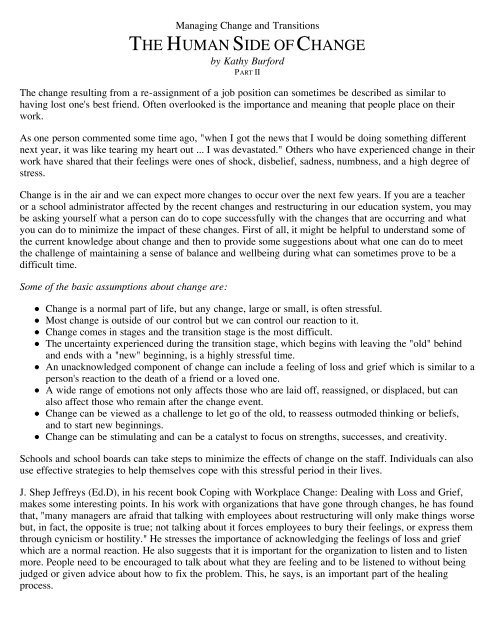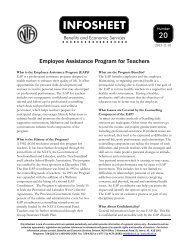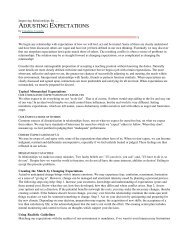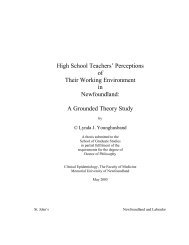The Bulletin, Vol. 40, No. 1 September/October 1996 from the NL ...
The Bulletin, Vol. 40, No. 1 September/October 1996 from the NL ...
The Bulletin, Vol. 40, No. 1 September/October 1996 from the NL ...
- No tags were found...
Create successful ePaper yourself
Turn your PDF publications into a flip-book with our unique Google optimized e-Paper software.
Managing Change and TransitionsTHE HUMAN SIDE OF CHANGEby Kathy BurfordPART II<strong>The</strong> change resulting <strong>from</strong> a re-assignment of a job position can sometimes be described as similar tohaving lost one's best friend. Often overlooked is <strong>the</strong> importance and meaning that people place on <strong>the</strong>irwork.As one person commented some time ago, "when I got <strong>the</strong> news that I would be doing something differentnext year, it was like tearing my heart out ... I was devastated." O<strong>the</strong>rs who have experienced change in <strong>the</strong>irwork have shared that <strong>the</strong>ir feelings were ones of shock, disbelief, sadness, numbness, and a high degree ofstress.Change is in <strong>the</strong> air and we can expect more changes to occur over <strong>the</strong> next few years. If you are a teacheror a school administrator affected by <strong>the</strong> recent changes and restructuring in our education system, you maybe asking yourself what a person can do to cope successfully with <strong>the</strong> changes that are occurring and whatyou can do to minimize <strong>the</strong> impact of <strong>the</strong>se changes. First of all, it might be helpful to understand some of<strong>the</strong> current knowledge about change and <strong>the</strong>n to provide some suggestions about what one can do to meet<strong>the</strong> challenge of maintaining a sense of balance and wellbeing during what can sometimes prove to be adifficult time.Some of <strong>the</strong> basic assumptions about change are:Change is a normal part of life, but any change, large or small, is often stressful.Most change is outside of our control but we can control our reaction to it.Change comes in stages and <strong>the</strong> transition stage is <strong>the</strong> most difficult.<strong>The</strong> uncertainty experienced during <strong>the</strong> transition stage, which begins with leaving <strong>the</strong> "old" behindand ends with a "new" beginning, is a highly stressful time.An unacknowledged component of change can include a feeling of loss and grief which is similar to aperson's reaction to <strong>the</strong> death of a friend or a loved one.A wide range of emotions not only affects those who are laid off, reassigned, or displaced, but canalso affect those who remain after <strong>the</strong> change event.Change can be viewed as a challenge to let go of <strong>the</strong> old, to reassess outmoded thinking or beliefs,and to start new beginnings.Change can be stimulating and can be a catalyst to focus on strengths, successes, and creativity.Schools and school boards can take steps to minimize <strong>the</strong> effects of change on <strong>the</strong> staff. Individuals can alsouse effective strategies to help <strong>the</strong>mselves cope with this stressful period in <strong>the</strong>ir lives.J. Shep Jeffreys (Ed.D), in his recent book Coping with Workplace Change: Dealing with Loss and Grief,makes some interesting points. In his work with organizations that have gone through changes, he has foundthat, "many managers are afraid that talking with employees about restructuring will only make things worsebut, in fact, <strong>the</strong> opposite is true; not talking about it forces employees to bury <strong>the</strong>ir feelings, or express <strong>the</strong>mthrough cynicism or hostility." He stresses <strong>the</strong> importance of acknowledging <strong>the</strong> feelings of loss and griefwhich are a normal reaction. He also suggests that it is important for <strong>the</strong> organization to listen and to listenmore. People need to be encouraged to talk about what <strong>the</strong>y are feeling and to be listened to without beingjudged or given advice about how to fix <strong>the</strong> problem. This, he says, is an important part of <strong>the</strong> healingprocess.
















